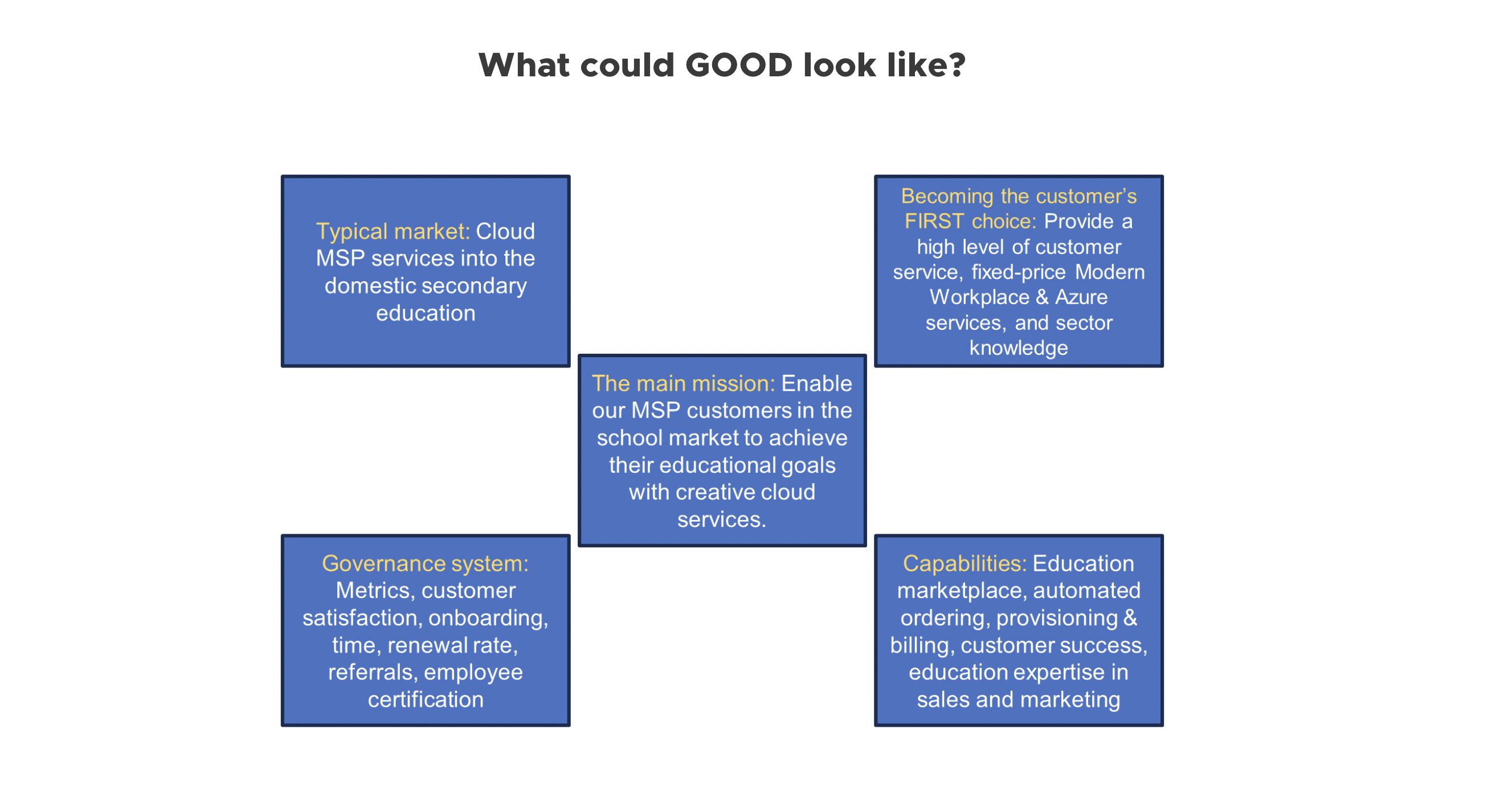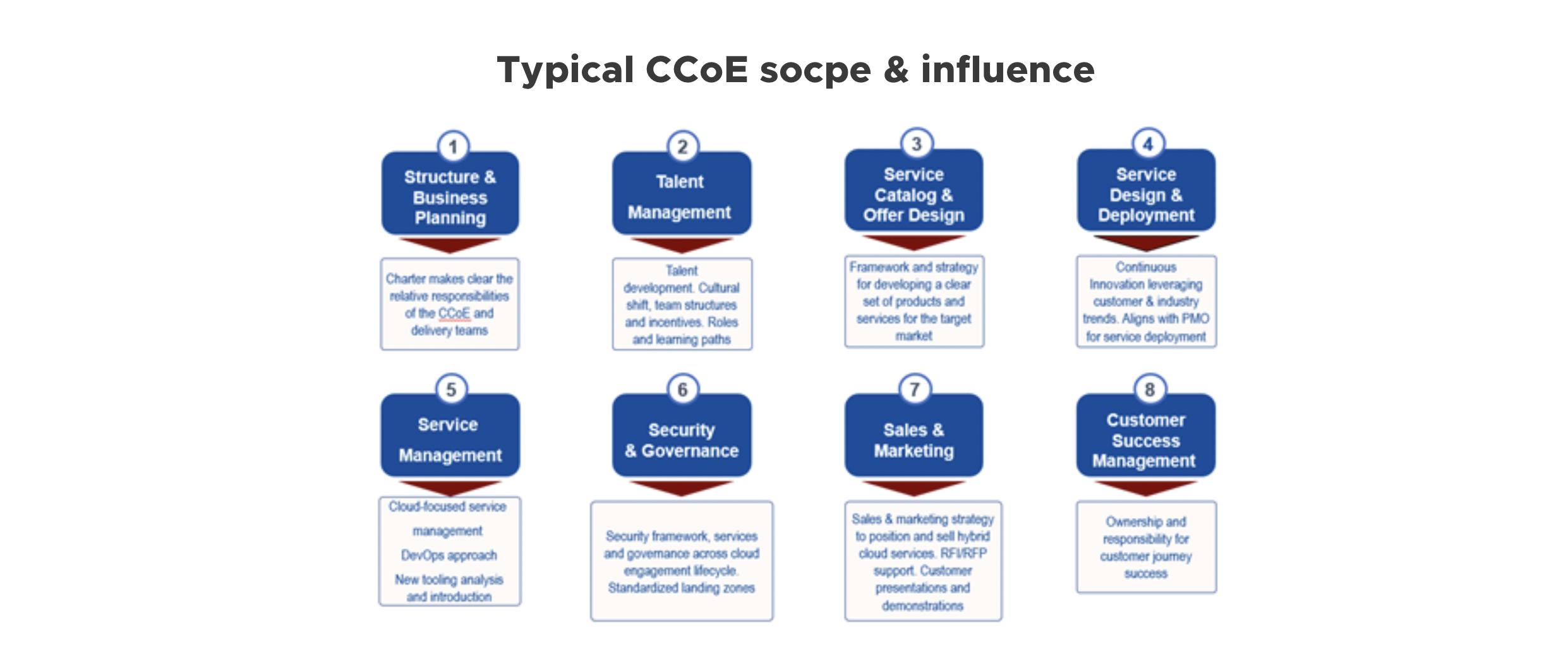Building a solid strategy for becoming a cloud managed service provider
Barry Turner
ISSI Head of Global Marketing & Senior Consultant

Becoming a Cloud Managed Service Provider in the hyper-scale cloud business is a big step-one that can build long-term profitability, grow customer markets, and attract the best talent. At ISSI we work with hundreds of cloud partners around the world, many of them interested in becoming MSPs.
Developing an effective, coherent strategy for becoming an MSP is a different matter. The desire to achieve the MSP designation may be strong, but if partners lack a clearly defined path for getting there, they can waste a lot of valuable time and resources.
Each company has unique circumstances that will affect its MSP planning, but there are general guidelines for what elements will help. When I talk about this with partners, I recommend an approach outlined in "Playing to Win" by A.G. Lafley and Roger Martin. The authors, who helped CPG giant Proctor & Gamble achieve phenomenal success, lay out a clear path for establishing successful strategies. I think the Lafley/Martin recommendations are relevant to cloud partners seeking to become MSPs. Let me explain.Cloud
Making Informed Strategic Choices
An effective strategy is built by carefully considering five distinct questions. The answers to each represent choices a partner will make. Taken together, they support a cohesive strategy.
It starts with What is the main mission driving the business? What is your overarching goal for becoming an MSP? Are you planning to win and outperform other businesses in whatever portion of the market you decide to compete in? Or are you willing to be one of many partners offering the same services and solutions? I always recommend that partners choose the first option. It will resonate with customers, it will help you set high goals for your solutions portfolio and customer service, and it will motivate employees.
Next up is "What is your ideal target market and customers?" You probably won't succeed if your first inclination is to pursue very large or multiple customer markets. It is better to focus on geographies or customer verticals that mesh well with your company's skill sets and then grow from there. Make decisions based on customer research and data. This does not have to be expensive or time-consuming. For example, I worked with a partner in Wales. After some discussion, they realized that their core group of customers were all non-profits and so they created a successful MSP practice with a tight focus on that customer base. In another example, I worked with a company specializing in the SMB market. They created a narrowly focused but successful business model providing services and solutions that are easily understood by small- and medium-sized businesses with limited IT staff or experience, and price their offerings to appeal to those customers.
Once you've established the "what" and the "where," the next decision is deciding "How to make your company a customer's first choice." What services will you provide that will appeal most to the broadest set of your target customers? How will you differentiate those services from your competitors? Put yourself in your customers' situation and try to honestly assess why they would select you over competitive offerings. How will your services help your customers achieve their goals? And how will you manage the customer across the full lifecycle to cement their loyalty and open the door for references and new opportunities?
Related to winning is knowing "What capabilities are needed?" List the skills and processes needed to deliver services, and how you can use automation for at least some of them. What people do you need to successfully execute service delivery, and how will you recruit and retain them? What will a successful sales organization look like, and what skills will your sales reps need to find customers and close deals? Also, don't forget to plan for the commercial processes that will handle billing and other transactional activities.
Finally, a successful MSP strategy requires a solid Governance System, including management processes and regular reviews of how well the prior four strategic steps are working. Within an MSP this will typically contain all or most of the following:
- Cloud strategy ownership is defined within the CCoE, with executive sponsorship where relevant
- An approved set of key performance indicators to measure progress, such as customer satisfaction, pipeline growth, and gross margin
- A set of strategic initiatives such as design and commission of a CMP (Cloud Management Platform)
- A RACI matrix defining who is responsible, accountable, needs to be consulted, and needs to be informed
- A schedule of governance reviews
- A backlog or work breakdown of strategic initiatives
- A list of the specific systems needed to govern the strategy implementation
The CCoE's Role In Creating And Implementing The Cloud Strategy
The CCoE (Cloud Center of Excellence) should be the epicenter and governing body for a partner's MSP strategy, its implementation, and its long-term management. A properly functioning CCoE will have broad scope and influence, affecting almost every aspect of a company's operations. Typically, these will include strategy and business planning, talent management, the service catalog, service design, security & governance, sales and marketing, and customer success.
You can find in-depth CCoE discussions on the ISSI website here and here. To provide a quick summary, however, a typical CCoE's scope and influence affect these eight key areas:

An MSP Case Study
Let's consider a brief, hypothetical case study demonstrating the "informed strategic choices" for a partner that has some limited but successful experience in the education market. The partner's "main mission" could be enabling its MSP customers to achieve their educational services goals with creative cloud services. The "target market" could be providing cloud services for the domestic secondary education market. The "become the customer's first choice" part will be providing a high level of customer service with a fixed-price modern workplace based on Azure services, combined with deep knowledge about this sector to address customer concerns and questions. The "Capabilities" would include an education services marketplace; automated ordering, provisioning, and billing; and a long-term customer success strategy backed by education expertise in sales and marketing. Finally, the "governance system" would be comprised of metrics for customer satisfaction and onboarding times, tracked renewal rates, referrals, and employee certification.

SUMMARY
Becoming an MSP with the major cloud vendors can be a major leap forward in a company's success. Evaluating each of the choices and integrating them with a CCoE can be the next big step in a partner's evolution.
Barry Turner is ISSI's Head of Global Marketing & Senior Consultant. He has 25 years of service creation experience working with telecommunication and cloud service providers across EMEA on behalf of ISSI, Microsoft, Cisco, Mitel & Agile Programmes. He currently holds ITIL V4 Foundation, and ISO27001:2013 lead auditor certifications and is PMP certified.
To learn how ISSI can help your company navigate the process of becoming an MSP, visit https://www.issi-inc.com/cloud-management-platform-analysis-and-implementation/
Alternatively, please contact sales@issi-inc.com
References
Playing to win: How strategy really works by A.G. Lafley and Roger L.Martin
https://hbr.org/books/playing-to-win
Additional Articles
Harnessing AI: Transforming Cloud Management for Managed Service Providers
Amarnath Gutta, Senior Consultant, ISSICloud infrastructure management involves provisioning resources, scaling based on demand, and performing routine maintenance tasks. AI-powered automation takes over these repetitive and time-consuming tasks, ensuring the cloud infrastructure is optimized without constant human intervention.
Moving Towards a Greener IT
Abdul Shakhashiro, ISSI Senior ConsultantAdherence to environmentally sound practices-and the ability to show measurable results around those practices-is affecting the global partner community. Yet in our work with cloud partners, we often run into organizations that are just beginning to understand the business consequences of not establishing best practices for reducing the impact on the environment.
Leveraging the Power of the Well-Architected Framework
Barry Turner, Senior Consultant, ISSIThis blog will provide an overview of the Well-Architected Framework (WAF), the benefits it delivers, and how to start using it. I will also briefly discuss the role of the WAF in conjunction with the Cloud Adoption Framework.
- 26 FEB 2025
Configuration Management Databases: Adding value for partners and their customers
Barry Turner, Senior Consultant, ISSIThe key to implementing an effective CMDB is having accurate information. In the rapidly changing cloud world, information on every configuration item must be automatically and frequently updated. This can be done in real time, although it is more commonly done once a day, either overnight or in a low-demand period.
17 APR 2025The Growing Importance of Certified AI Managers
Lazar Kaluderovic, Senior Consultant, ISSICertified AI managers play a crucial role in this environment by integrating artificial intelligence into business operations. Their roles extend well beyond the basic implementation of AI-driven solutions, with responsibilities that include ensuring alignment with legal frameworks, assessing and mitigating risks, and fostering trust in AI systems.
29 JAN 2023Building blocks of a customer success practice
Jonathan Lee, ISSI Customer Success Practice LeadBuilding Blocks of a Customer Success Practice By Jonathan Lee – ISSI Customer Success Practice Lead Customer Success Practice Blog Series #3 As mentioned in
